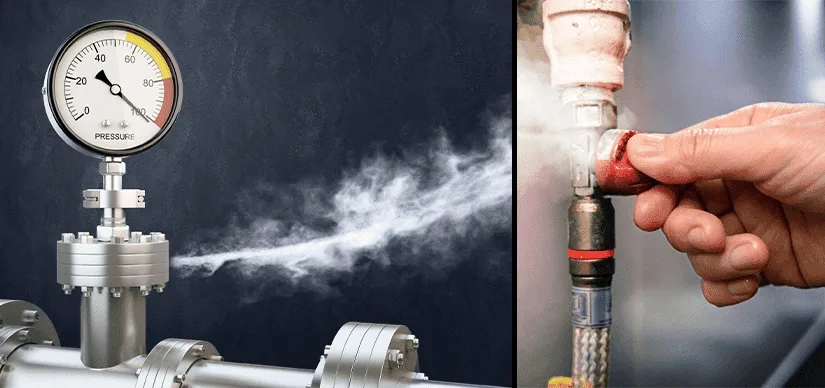Gas Leak Emergencies: What To Do And Who To Call
Views : 745

As far as household appliances are concerned, most homes in San Diego and anywhere else depend on gas-powered appliances to run their homes.
Sometimes these appliances may break down as a result of gas leaks, and if discovered earlier, lead to expensive gas leak repairs in San Diego.
Gas emergencies are unpredictable, they can spell danger when they happen, hence, the need to know what to do and who to call for help when it happens.
What are gas leaks
When gas escapes from its intended containment—such as a pipe or tank—and enters an area where it could catch fire or endanger people and animals, it is said to have a leak.
Gas leaks in the house can be brought on by a number of things, including corrosion, broken equipment, and human error.
Natural gas and propane, which are used for heating, cooking, and other purposes in homes and businesses, are the most frequently involved gases in gas leaks.
Due to the gas’s high flammability and potential for fires, explosions, and other hazards, gas leaks can be extremely hazardous.
Common Locations for Gas Leaks
Gas leaks can occur in a variety of locations, but there are some places where they are more likely to happen. Some of the most common locations for gas leaks include:
Kitchen
Gas leaks can happen in the kitchen due to gas stoves and ovens. If not maintained properly, these appliances can cause a gas leak in the house.
Water Heater
Water heater gas leaks are another frequent issue. Gas may leak from the water heater’s gas line and enter the neighborhood if this happens.
Also Read : How do I handle a gas leak in my water heater?
Furnace
Gas leaks could also originate from gas furnaces. Gas could escape from the furnace through cracks or holes, which could be extremely dangerous.
Gas Appliances
Among the most frequent sources of gas leaks are gas stoves, ovens, water heaters, and dryers. These appliances burn propane or natural gas, which can leak if they are not installed, maintained, or repaired correctly.
Gas Lines
Gas leaks can also originate from the gas lines that connect your home to the gas meter and from there throughout your entire home. Over time, gas lines may corrode or sustain damage, leading to leaks.
HVAC Systems
Furnaces, boilers, and other HVAC systems that use natural gas can also be a source of gas leaks. These systems can develop leaks if they are not properly installed, maintained, or repaired.
Pipelines
Underground natural gas pipelines are also susceptible to leaks. Numerous things, such as corrosion, damage from digging, and natural disasters can result in these leaks.
Detecting Gas Leaks
Natural gas has no smell and no color, so it can be challenging to find gas leaks inside the home.
To give the gas a distinctive sulfur or rotten egg smell, gas companies add a substance called mercaptan to it. It’s crucial to act right away if you smell gas inside your home.
Here are some signs that you may have a gas leak:
Physical Symptoms
Exposure to natural gas can cause headaches, dizziness, nausea, and other physical symptoms. If you experience any of these symptoms and suspect a gas leak, leave the house immediately.
The smell of Gas
If you smell gas in your house, it’s likely that there is a gas leak somewhere.
Hissing Sound
If you hear a hissing sound near a gas appliance or gas line, it may indicate a gas leak.
Dead Plants or Grass
If the plants or grass around your gas meter or pipeline are dead or discolored, it may indicate a gas leak in the area.
Higher Gas Bills
If your gas bills are higher than usual and you haven’t been using more gas, it may indicate a gas leak.
What to Do
To ensure your safety and the safety of those around you, it’s critical to act quickly if you suspect a gas leak in your home. Here are the actions you need to take if you think there is a gas leak:
Don’t Turn Anything On or Off
Avoid using electrical outlets or switches, or turning on or off any lights or appliances. These actions have the potential to spark the ignition of the gas.
Do Not Smoke or Use Open Flames
Do not smoke or use any open flames, including matches, lighters, or candles. These actions can also ignite the gas.
Evacuate the area immediately
If you smell gas or hear hissing or blowing sounds near a gas appliance, leave the area immediately. Do not turn on any lights, as a spark could ignite the gas.
Don’t use any electrical items
Switches, appliances, or phones, as any electrical spark could also ignite the gas. Leave doors and windows open as you exit the building to help ventilate the area.
Call for help
Call your gas provider or emergency services once you are outside and at a safe distance from the gas leak. Calling from inside the house or close to the gas leak is not advised because it could be dangerous.
Do not re-enter the area until it is safe to do so
Before returning to the area, wait for the gas company or emergency services to arrive and give the all-clear. If it is safe to return inside, they will decide.
Do not attempt to fix the problem yourself
Gas leaks can be very dangerous, and attempting to fix the problem yourself can be risky. Leave it to the professionals to handle the problem safely and effectively.
Wait for Help to Arrive
Stay outside and wait for help to arrive. Do not re-enter the house until it has been declared safe to do so by a professional.
Remember, gas leaks can be very dangerous, so it’s important to take them seriously and follow these steps to ensure your safety and the safety of others.
Who to Call When You Have Gas Leaks
It’s essential to call for assistance right away if you think there might be a gas leak. Here are some experts you can get in touch with:
Gas Company
If you suspect a gas leak, the first call you should make is to your gas company.
You can call the 24-hour emergency hotline provided by the majority of gas companies in the event of a gas leak. A technician will be dispatched to your house to look into and address the issue.
If you’re unsure of the name of your gas provider, you can look up their contact details online or on your gas bill.
HVAC Technician/Licensed Professional
You can get in touch with a qualified San Diego plumber if you can’t reach your gas company or if they can’t help.
Gas leak repair in San Diego is provided by EZ Plumbing USA, a dependable and well-known plumbing business. Gas leaks in your home can be quickly and safely repaired thanks to their team of qualified experts.
Emergency Services
Call 911 right away if you smell gas but are unable to leave the area, if there is a fire or explosion brought on by a gas leak, or in any other emergency situation. Emergency services are able to help and safely evacuate the area.
Keep in mind that gas leaks can be extremely dangerous and ought to be taken seriously. It’s crucial to call for assistance and immediately evacuate your home if you suspect a gas leak. You shouldn’t try to solve the issue on your own, as this can be risky and lead to more damage.
Conclusion
Gas leaks in the house should be handled carefully because they can be dangerous. It’s crucial to understand how to spot a gas leak and what to do in an emergency.
Remember to leave the area right away if you think there might be a gas leak in your home, contact your gas provider or a qualified professional, and avoid attempting to fix the issue yourself.
You can get gas leak repair in San Diego from EZ Plumbing USA if you live in San Diego. Gas leaks in your home can be quickly and safely fixed by their team of qualified experts, giving you peace of mind and ensuring the safety of your family.
